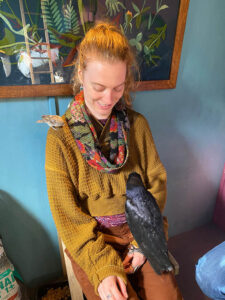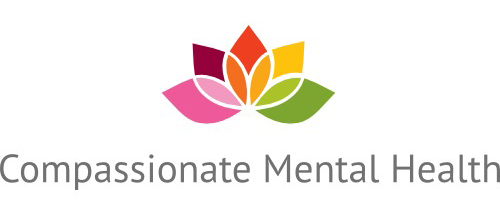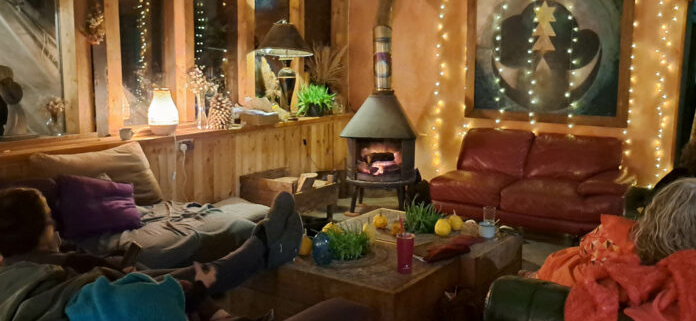Not Just a Dream: Finding the Mental Health Community I’d Been Longing For by Robyn Thomas
This piece was first published in Mad in America – read the original here
Several weeks after being committed under the Mental Health Act, still dopey from mandated antipsychotics, I had a dream. They were shatteringly vivid then—usually involving fleeing from hospital staff who wanted to lock me up and inject me with sedatives. But this dream was different, and it turns out, not so far from a possible reality.
These days, I research alternatives to approaching psychosis, voice-hearing and unshared realities at the University of Edinburgh, which often feels like a surreal leap from surviving a psychiatric ward in Canada known for emotional abuse and patient maltreatment. Prompted by a last-minute invitation, I recently traveled to the 13th Compassionate Mental Health retreat in Coed Hills, Wales. The three-day gathering delved into compassionate alternatives for understanding and working with mental distress, continuing to be a beacon for what mental health services can become. For me, the retreat was more than a beacon—it was exactly what I’d been longing to find since I stumbled out of a locked ward eight years ago, squinting in the outdoor light.
Returning to my Roots
Coed Hills is an off-grid sustainable arts community where members grow food using permaculture techniques, run a pottery studio, construct their own yurts and cabins, and host eclectic events such as this retreat. After being shown to my “pod”—a tiny wooden cabin shared with a roommate, I wandered through the modern-day stone circle made using ancient techniques, with giant stones rolled up the hill on logs. The lichen-spotted stones kept vigil over the lush valley below, only 30 minutes away from the small farming and former coal mining village where my grandfather had grown up. The family story is foggy, but after working abroad in his youth, he came home extremely ill, malnourished, and suffered a breakdown. The authorities wanted to send him to a mental asylum, but my great-grandmother refused to let him be taken. She knew he would be warehoused for life, that he would never come out again, so she nursed him back to health for a full year. If she hadn’t given him a safe place to heal, I wouldn’t have been born. He wouldn’t have become the loving and cheeky grandfather who somehow knew to call me when I was in the weeds of my own breakdown to tell me how deeply he loved me.
Many people at the retreat had been harmed by modern psychiatry in heartbreaking ways—for many of us, mental health services still aren’t safe. They’re too entangled with control, coercion, sanism, and violence.
In a mental health landscape increasingly polarised by those critiquing or calling to abolish psychiatry, and those wanting to improve access to psychiatry, the retreat was a refreshing space that acknowledged the harm of current mental health systems while welcoming clinicians working within them.
People with experiences of psychosis and distress attended alongside psychiatrists, therapists, and NHS workers. As articulated by the founder of Compassionate Mental Health, Brigid Bowen, “We are moving beyond that separation between those who are unwell and finding things particularly difficult, and those who are supposedly “well”—the fixers, the experts. We’re acknowledging life is difficult and full of suffering—there is so much conflict in the world right now—so we are all here building our resources, building community and connection.”
Over a communal dinner of pakoras, mango salsa, salads, and soup—most of the ingredients grown in the gardens—I met people of all ages and backgrounds who spoke openly about bereavements, psychosis, altered states, spiritual experiences, and visions for a compassionate, non-coercive mental health system. It was the first time I’d been in a space where psychiatrists dined next to “patients,” where people dove straight into topics that often take years to broach with close friends. Cautious, I hid behind my PhD student identity, reluctant to divulge my own story.
Every day, we strolled through the gardens to the spacious refurbished barn to eat in the dining hall or lounge on well-worn sofas around the woodburning stove, propping ourselves up on multi-coloured pillows. Weavings, wreaths, metal sculptures, paintings, and fairy lights adorned the walls. Before sunrise, keeners attended a yoga and breathing workshop which took place in a circular, wood-panelled gathering area.
The daily workshops ranged from Open Dialogue and movement workshops to sauna sessions and trauma-informed equine therapy. There was even a bushcraft workshop where we learnt to start campfires with flint and magnesium, using foraged mushrooms as fire starter. Perhaps an unlikely therapeutic activity, but as we warmed ourselves around the flames, learning about the treasures found in the forest, laughing and sharing stories, life’s tensions began to unravel.
Back indoors with a mug of tea, we spoke about loss of community and connection, how mental health interventions are often about artificially restoring basic human needs like support groups into people’s lives. Most of us know loneliness in some way and crave a different kind of relating.
A bond I never imagined forming during the retreat was with a crow, Apollo, and a sparrow, Rainbow. The owner of a wild bird rescue invited people into her cabin to meet her feathered friends. We were told the birds would be affected by whatever emotional state we brought into the room, so we were guided through breathing exercises before entering. Sure enough, Apollo shook his feathers with irritation and anxiety until we calmed ourselves. The delicate-boned sparrow flew over to my shoulder and nuzzled into the nest of my scarf, eying me with curiosity. I carried that feeling of flight, of joy, with me for the rest of the day—the connection to the land, the stones, the animals as precious and restorative as that of my newfound human friends.

Robyn with Apollo and Rainbow
Restoring Trust and Hope
After lunch, the Open Dialogue facilitators had us break off into “compassion pods” where we shared what had brought us to the retreat. A social network model of supporting people through psychosis and crisis, a core principle of Open Dialogue is tolerating uncertainty. Clinicians learn to deeply listen to people with lived experience and their loved ones and come up with solutions together, minimising the emphasis on clinical hierarchies, diagnosis, and overuse of medication. “Sometimes the hardest thing to do is what feels like nothing at all,” shared one of the facilitators—if you’re trying to fix someone, you’ve stopped listening.
In my small group, a father shared his story of losing his child to suicide, and the dehumanising treatment their family received at the hospital. When it was my turn to share, I could no longer avoid what had really brought me there or hide behind the researcher title. “Ummm… well… I guess when I wasn’t doing well, I took myself to the hospital. Voluntarily. The psychiatrist prescribed me heavy tranquilisers that night and said I could sign out the next day and attend my job interview. The next morning, I was still sedated from the meds, and when a new psychiatrist noticed my speech was slurred, she diagnosed me with schizophrenia within five minutes and told me I wasn’t allowed to leave. Terrified, I grabbed my belongings and ran, not understanding anything about the Mental Health Act. Security followed me, labelled me a non-compliant flight risk, and threw me into a high security locked unit where staff gave me competing labels, a cocktail of drugs, and never spoke with me about my life. After the shock of being incarcerated and humiliated, I became fully psychotic. I think I just needed some understanding… some kindness for what I was going through at the time. The treatment… well, it was literally maddening.”
Grieving Together
Once we wrapped up the compassion pods, I slipped out the doors, crossing the stone circle into the moss-blanketed forest. Striding through tangled branches and brambles, over mud, rock, and mushrooms, I found my breath again. Most people become uncomfortable or defensive when you point out how mental health care can be abusive. When I worked for a mental health charity, I was told never to share critiques of the mental health system because it might discourage “help-seeking behaviour,” and our funders were often health authorities. It can be jarring to listen to anger, to people who have been harmed and abused by the very institutions claiming to help. But grieving together is a vital piece of healing. To have that harm be acknowledged by clinicians willing to listen and be humble, who want to work in a different way… it restores trust and hope. It makes possible a more compassionate way forward.
Later, I attempted to hermit in the upstairs loft and become one with the couch. Too much emotional interaction for one day, thank you very much. But life had other plans, and people filtered over to the adjoining couches. A reflection circle was taking place, run by facilitators who work in therapeutic communities. I intended to stay silent and listen, but instead found myself clearing my throat and unsuccessfully trying not to cry. “Yeah, I guess I can say something. A few weeks after I was hospitalised, I had a dream about a place like this…”
In the dream, a psychic refuge from the nightmares of being locked up and threatened, I was transported to a different kind of hospital. A home in the hillside, there was art on the walls, warm lights, a glowing fireplace, no locked doors. Outside, a garden brimmed with gnarled trees, fruits, and vegetables. There was a deep sense of safety; a knowing that the healers understood and weren’t afraid of intense states like madness. They embraced it; maybe they’d been through it themselves. They didn’t want to wrestle us into submission, they wanted to help guide us through, right into the murky core, find meaning and insight in what everyone else called symptoms of a broken brain.
“And this gathering,” I continued shakily, “is just like the place I dreamt about, what I longed for. It’s surreal to be here, and it’s also… so sad…
This is what I needed. This kind of a space. And instead, it was more trauma and fear. So… it’s this strange feeling of hope and sorrow. That places like this are on the fringes when this way of approaching suffering is so obvious. This is so, so obvious. A connection to the land, people who understand, who hold space for each other and alongside each other. Food, fires, movement, working through the hard stuff, being.” My words fall short. It’s simply the basics of what human beings need, not just unwell people. Community, connection, belonging—these medicines that keep eroding.
On the final evening, a handful of us tentatively started a dance, drum, and singing circle. The wariness I often feel around psychiatrists dissolved as we grinned and grooved to the music, the drums beating away diagnostic labels and career or carer titles; everyone was working through something, shaking off some heaviness, and soon the circle swelled with people jiving to the music, banging on drums, finding vocal harmonies. We mirrored and listened to each other, creating and holding onto that invisible river of rhythm, that overlapping heartbeat.
For three days, we were invited to speak about death and loss, about love and rage, about hope and injustice, about deep pain and deep longing. When I was in a psychiatric ward, meaningful conversations were prohibited. We were handed suicide checklists every day, forced to tick boxes assessing whether we wanted to off ourselves or not. Every person in that ward knew to just tick the box and pretend they were thinking of nothing but sunshine and compliance, lest they be punished with an extended stay. Shut up, keep your head down, suppress the experience. Spaces like the Compassionate Mental Health retreat embrace discomfort, hold space for intense emotions, grapple with the excruciating beauty and uncertainty of living. It’s shocking how rare, how precious these spaces are. You can find them in little pockets or transient fragments here and there. But to wander into a micro-world, where it is the norm, the reality, to welcome our unwieldly human complexity—now that is something to pay attention to. That is something to dream into reality.
***
Save the dates for our next Compassionate Mental Health Gathering – 8-11 September 2025 – more details coming soon



Leave a Reply
Want to join the discussion?Feel free to contribute!